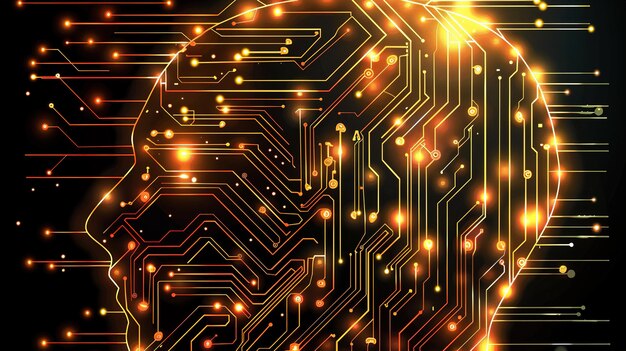How Will New AI Regulations Affect You? A US News Analysis

New federal regulations on artificial intelligence (AI) in the US will likely impact individuals through changes in employment, increased attention to data privacy, and the potential for bias mitigation in crucial sectors such as finance and healthcare.
The rise of artificial intelligence is rapidly transforming numerous aspects of our lives. Now, with the introduction of new federal regulations, it’s crucial to understand how will the new federal regulations on artificial intelligence affect you?
Understanding the Impetus Behind AI Regulations
The explosive growth of artificial intelligence has captured the attention of both innovators and lawmakers. Public and private entities alike have a need to address AI’s rapid expansion. Federal regulation of this technology is being explored to set guardrails that foster innovation while mitigating potential risks to citizens and the economy.
The Need for AI Oversight
The demand for AI regulations arises from the potential for misuse and unintended consequences. Without proper oversight, AI systems could perpetuate biases, violate privacy rights, and pose risks to public safety. Regulations aim to create a framework that encourages responsible development and deployment.
- Ensuring Fairness: Regulations can help prevent AI systems from discriminating against certain groups, ensuring equitable outcomes.
- Protecting Privacy: New rules can safeguard personal data used by AI, reducing the risk of data breaches and misuse.
- Promoting Transparency: Regulations can require AI systems to be more understandable, allowing users to know how decisions are made.

The push for new AI regulations in the United States is not without its challenges, yet it is deemed necessary to safeguard American interests. These regulations are intended to set the stage for businesses and citizens to utilize AI safely and ethically.
Key Areas Targeted by Federal AI Regulations
The federal government is focusing on specific areas where AI poses significant challenges and opportunities. By targeting these key sectors, regulations can have a meaningful impact on the development and deployment of AI across the nation.
Employment and the Workforce
AI is transforming the job market, automating some tasks and creating new opportunities. Regulations are being considered to ensure that AI does not lead to unfair labor practices or exacerbate existing inequalities in the workforce.
Data Privacy and Security Concerns
Another area of focus is data privacy. AI algorithms often rely on vast amounts of personal data, raising concerns about how this data is collected, used, and protected. Federal regulations aim to establish clear guidelines for handling sensitive information.
Data security is becoming increasingly important with cyber criminals and international rogue groups causing threats to citizens worldwide. Data regulations are intended keep data secure and help to guarantee privacy as it relates to AI information gathering. By understanding the challenges, Americans can get ahead of potential threats and damages produced by unregulated AI.

Key areas targeted by AI regulations involve significant challenges and require attention. Federal intervention is required to address these concerns. Creating comprehensive rules around AI will protect civil liberties and individual information.
Potential Impacts on Businesses and Industries
The introduction of federal AI regulations is poised to reshape the business landscape. Organizations across various sectors will need to adapt to new requirements, which could affect their operations, innovation strategies, and competitive positioning.
How Compliance Could Affect Operations
Complying with new AI regulations may require businesses to invest in new technologies, processes, and training programs. This could lead to increased costs in the short term, but also to longer-term improvements in their reputation.
- Financial Services: AI is used for fraud detection and risk assessment, and regulations may require more transparency in these processes.
- Healthcare: AI is used for diagnostics and treatment recommendations. Regulations may affect the patient privacy, requiring data security and compliance.
- Transportation: Regulations could impact the deployment of autonomous vehicles and other AI-driven systems, ensuring safety and accountability.
Businesses are evaluating resources to dedicate to compliance activities, and organizations are weighing the benefits of AI opportunities. Understanding, monitoring, and complying with each new rule will likely create new costs to businesses that rely on AI.
How AI Regulations May Affect Your Personal Life
While federal AI regulations are primarily aimed at businesses and industries, they are also likely to impact individuals in various ways. These regulations promise to influence employment, data privacy, and consumer experiences.
Changes In Employment Opportunities
While AI may eliminate some jobs, it is also expected to create new ones, particularly in areas such as data science, AI development, and AI ethics. Individuals may need to acquire new skills to remain competitive in the changing job market.
Mitigating Biases in AI
AI systems can sometimes perpetuate biases present in the data they are trained on, leading to unfair outcomes. Federal regulations may require AI developers to take steps to identify and mitigate these biases. Mitigating bias will create a fair environment for business and improve trust between consumers and organizations.
People will likely feel an impact on a daily basis through their interactions with AI. As AI becomes more prevalent, understanding the role of regulation in maintaining fairness is critical for citizens.
Navigating AI’s Future Ethical and Legal Challenges
The future of AI is intertwined with complex ethical and legal considerations. As AI becomes more sophisticated and integrated into society, addressing these challenges will be essential for ensuring a beneficial and equitable future.
Striking the Right Balance in Regulation
Ultimately, federal AI regulations aim to strike a delicate balance between fostering innovation and protecting citizens. By setting clear guidelines and promoting responsible development, these regulations can help ensure that AI benefits society as a whole.
- Data Collection: Regulations may set limits on the amount and type of data that AI systems can collect.
- Algorithmic Transparency: New rules may require AI algorithms to be more transparent, so users understand how decisions are made.
- Accountability: Regulations could establish clear lines of accountability for AI systems, making it easier to address issues when they arise.
As new rules are implemented, they will have a ripple effect on both creators and consumers of AI technology. Understanding the complex nature of the relationship between law, ethics, and emerging technologies requires an intelligent perspective.
Predictions for AI Regulations in the Next 5 Years
Peering into the near future, it’s apparent that regulations concerning artificial intelligence are on track to evolve considerably. Current movements and discussions suggest key trends that may define the regulatory environment in the coming years.
Enhanced Focus on AI Ethics Across Industries
Within the next five years, industries’ attention to AI ethics will likely intensify. AI ethics will demand companies to implement greater accountability measures. Regulations may begin to require extensive transparency in the construction and execution of AI systems, prompting organizations to emphasize ethical AI practices as imperative to upholding societal values.
Companies will need to employ individuals with the experience and knowledge to oversee the regulations or risk non compliances. By focusing on the details, American business can forge the future with ethics and care.
| Key Aspect | Brief Description |
|---|---|
| ⚖️ Fairness in AI | Regulations aim to prevent AI from discriminating against certain groups. |
| 🔒 Data Privacy | New rules could safeguard personal data used by AI, reducing the risk of misuse. |
| 💼 Job Market Changes | AI is expected to create new job opportunities but may require new skills. |
| 🛡️ Transparency Standards | Increasing the explainability of how AI makes decisions is vital. |
Frequently Asked Questions
▼
The main objective is to foster innovation while mitigating risks associated with AI, such as bias, privacy violations, and safety concerns. The goal is to promote responsible AI development and deployment within the United States.
▼
AI could eliminate some jobs but may also create new ones, especially in fields like data science and AI ethics. You might need to acquire new skills to stay competitive in a changing job market due to the impact of AI.
▼
Federal regulations may require AI developers to identify and mitigate biases in AI systems, promoting fairness in outcomes. This includes steps to prevent AI from perpetuating existing inequalities. Regulators stress this to ensure a level playing field.
▼
The regulations aim to establish clear guidelines for how personal data used by AI is collected, used, and protected. This includes measures to reduce the risk of data breaches and misuse, safeguarding personal information for users.
▼
Industries such as finance, healthcare, and transportation will be significantly affected. Regulations will impact how AI is used for fraud detection, diagnostics, and autonomous systems, among other applications across numerous sectors.
Conclusion
In conclusion, the new federal regulations on artificial intelligence are set to bring significant changes to businesses and individuals alike. From employment to data privacy, the impacts will be wide-ranging and require careful adaptation to ensure a future where AI benefits society as a whole.